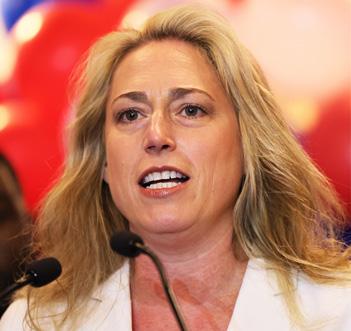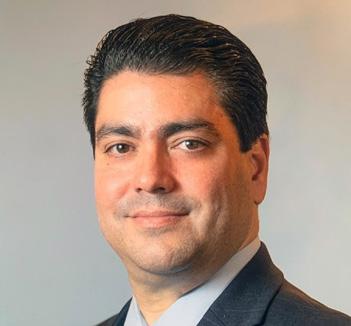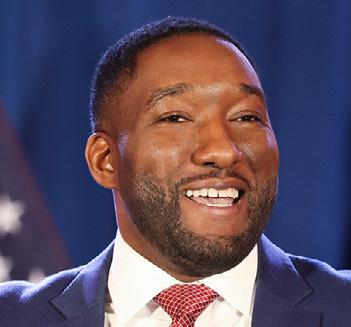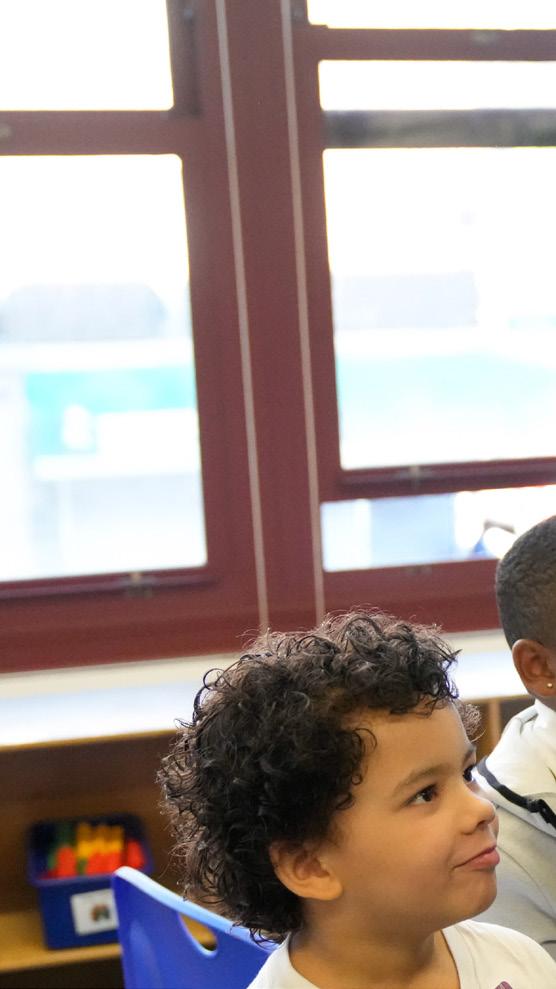
12 minute read
LEE ZELDIN
Lee Zeldin is taking his biggest risk yet No one said running for governor as a Republican in New York would be easy.
By Rebecca C. Lewis LEV RADIN/PACIFIC PRESS/GETTY IMAGES
Advertisement
WHEN FORMER Gov. George Pataki pulled off an upset victory against then-Gov. Mario Cuomo in 1994, Rep. Lee Zeldin had only just started high school. Pataki served three terms, with his last electoral victory coming in 2002.
Over the past two decades, Zeldin has done a lot. He joined the military, became a lawyer and, in 2010, won a seat in the state Senate by flipping his Long Island district from blue to red. Just four years later, he did the same to win his congressional seat.
After four terms in Congress, Zeldin is now taking a shot at running for governor. He almost faced off against former Gov. Andrew Cuomo, Mario’s son, in an attempt to block his path to a fourth term, just as Pataki had done for the elder Cuomo. Instead, Zeldin is challenging Gov. Kathy Hochul, who found herself thrust into the role following Cuomo’s resignation in 2021.
A lot has changed in 20 years. New York has become bluer, Democrats gained a supermajority in both chambers of the state Legislature and politics, both locally and nationally, has grown increasingly partisan. Zeldin, a conservative and staunch supporter of former President Donald Trump, is very different from other Republican gubernatorial candidates, including moderates like Pataki and Marc Molinaro. And many political observers, including Republicans, don’t see how Zeldin can obtain the winning coalition of independents and moderate Democrats that brought Pataki that first success in 1994.
But Zeldin is no stranger to taking risks in order to advance his political career. So far, it has worked out for him.
ZELDIN, 42, FIRST entered politics in 2008, when he ran an unsuccessful campaign against then-Rep. Tim Bishop, a Democrat, in the 1st Congressional District. Two years later, he defeated Democratic state Sen. Brian Foley to win in District 3. His victory was one of several GOP flips that brought the chamber back under Republican control after a short-lived and chaotic stint of Democratic rule. “It was not only one of the best speeches I’ve ever heard, it was one of the most compassionate, empathetic and meaningful speeches I’ve heard in three and a half decades of politics.”

– state Sen. Phil Boyle, on Zeldin talking about the Joseph P. Dwyer Veteran Peer Support Project
In Congress, Lee Zeldin was a staunch Trump ally.
During his time in the state Senate, Zeldin positioned himself as a conservative. Perhaps most notably, he found himself in the minority of Long Island Republicans when he voted against the 2013 SAFE Act, which enacted new gun control measures in the state. Although he did not actually vote on the bill due to his absence, his statement at the time that he would have voted against it made him the only Long Island lawmaker of either party to oppose the gun control measure. In fact, he was the only state senator from New York City or its immediate suburbs on Long Island and in Westchester to stand against it. “The actions government takes to protect its citizens through gun laws must strike the right balance of targeting illegal guns and the criminals who use them without eroding the basic protections of the 2nd Amendment for law-abiding gun owners,” Zeldin’s statement read. “Respectfully, I don’t believe that the gun package tonight strikes the proper balance and therefore I do not support it.”
Although his staunch support of gun rights in 2013 put him out of step with his fellow downstate Republicans at the time, it didn’t alienate him from fellow Long Island Republicans. “I have the greatest respect for Lee,” state Sen. Phil Boyle, a moderate and fellow Suffolk County politician, told City & State. The pair disagreed on several issues, the SAFE Act was just one of those, but Boyle said he considered Zeldin highly principled, despite their policy differences. He in particular spoke about Zeldin’s leadership in implementing the Joseph P. Dwyer Veteran Peer Support Project, referencing the speech he gave when the legislation passed. “It was not only one of the best speeches I’ve ever heard, it was one of the most compassionate, empathetic and meaningful speeches I’ve heard in three and a half decades of politics,” Boyle said. “When he feels strong about something … no one will put more dedication and passion into fighting for what’s right.”
Despite his conservative positions, Zeldin also displayed bipartisan chops by supporting environmental conservation proposals. Although generally associated with Democrats, it’s one of a handful of issues that cross party lines on Long Island, an area of the state particularly well known for the swingy nature of its politics and the ballot-splitting tendencies of its voters. “I think Lee Zeldin, having grown up and representing citizens on Long Island, is much more attuned to environmental issues than perhaps someone from far upstate New York,” Boyle said, noting that it’s not generally an area from which Republicans emerge as leaders. In Congress, Zeldin has worked in a bipartisan manner on several clean water initiatives affecting Long Island as a member of Congress, although he opposed the Paris Agreement on climate change that was supported by Democrats.

IN 2014, ZELDIN moved from the state Senate to the House after winning a rematch against Bishop. He wasn’t an early Trump endorser (like former Rep. Chris Collins) or a particularly enthusiastic one when he did back Trump in May 2016 after the nomination was clinched, telling Newsday: “Even though I don’t agree with Donald Trump on everything, and I think there may be certain things or statements of his that I may disagree with, he is a better candidate by far than Hillary Clinton.”
However, he became one of the former president’s staunchest allies and biggest defenders during Trump’s first impeachment. He later voted against certifying the 2020 presidential election results as Trump advanced false narratives about widespread voter fraud and a stolen election. Now, as Zeldin seeks to become the first GOP governor of New York since 2006, that past support has become a liability.
Winning as a Republican statewide in New York has long been an uphill battle and has only gotten harder over the years. Pataki positioned himself as a moderate who supported same-sex marriage and gun control measures, and considered himself to be in favor of abortion rights even back in 1994 when he first won a gubernatorial election. They’re positions that historically Zeldin has not shared – he voted against same-sex marriage as a state senator in 2011, applauded the U.S. Supreme Court decision overturning the right to an abortion and vocally supports gun rights. With the overwhelming disapproval of Trump in New York and abortion rights fueling left-wing resurgences across the nation, Zeldin has hardly positioned himself as the traditional New York Republican even as he has attempted to distance himself both from Trump and abortion rights since winning the GOP primary.
Despite the obvious differences in their campaigns and ideologies, Pataki nonetheless endorsed Zeldin and believes he has a clear path to victory. Zeldin has made public safety the cornerstone of his campaign, and the former governor said that’s a winning strategy. “We need a governor who starts from Day One with a dramatic change to the criminal justice system,” Pataki told City & State. “It’s failing New Yorkers … and Lee Zeldin I think has the right ideas, the right focus.” He mentioned Zeldin’s support of repealing the 2019 bail reform laws that eliminated cash bail for the majority of nonviolent offenses as well as his promise to remove Manhattan District Attorney Alvin Bragg from office. Pataki, who did not support Trump and had even called for him to step down as the Republican nominee for president in 2016, predicted that Zeldin’s strong ties to the former president nor his anti-abortion stances would play a major role in the election. “The Democrats are going to clobber him on abortion, but the abortion laws in New York aren’t going to change,” Pataki said. “But what can change and what must change are the criminal justice laws.”
Hochul has certainly made attacking
Crime has been Zeldin’s top talking point on the campaign trail.
Zeldin on abortion a major part of her campaign. After he put out a statement lauding the decision to overturn Roe v. Wade as “a victory for life, for family, for the constitution and for federalism,” Hochul ran multiple television ads both highlighting her own work protecting abortion rights and Zeldin’s opposition to them. She also made a point to criticize his support of Trump and decision to vote against certifying the 2020 presidential election results.
According to public polling, the majority of which has Hochul leading by double digits, Pataki may be right about abortion not playing a major role in November. According to a Siena College poll from last month, only 15% of New York voters surveyed considered it to be among their top two issues for the upcoming election. But crime did not poll among the top two issues either. Rather, threats to democracy was top of mind for 22% of those polled, second only to inflation and the economy. While the phrasing was vague enough to invite multiple interpretations, the data suggested that New Yorkers may not be so quick to forget Zeldin’s allegiance to Trump, whose followers attempted to violently overturn the election by storming the U.S. Capitol on Jan. 6, 2021.
ALTHOUGH THE ODDS seem stacked against Zeldin to form the coalition of voters necessary to win in New York, he has made inroads in a particularly powerful New York City voting bloc that has traditionally supported Democrats – Orthodox Jews. Hasidic communities in Brooklyn have welcomed Zeldin, who is one of only two Republican Jewish lawmakers in Congress, with open arms on the campaign trail, even as many leaders in the community have refrained from endorsing him. “I think for a lot of people in the Jewish community … the vote for Zeldin will be overwhelming,” former Assembly Member Dov Hikind, who used to represent parts of Brooklyn with large Orthodox Jewish populations and remains an advocate for the community, told City & State. Although a Democrat, Hikind recently endorsed Zeldin. “It’s not a question of who people in those communities are going to vote for, it’s just getting the maximum number of people out,” Hikind said.
Although Orthodox leaders in New York City typically back Democrats, the community tends to be more ideologically conservative overall. Rallies and protests in support of Trump were not an uncommon sight in Borough Park, Brooklyn, in 2020 before the presidential election. Winning statewide without support in the city is impossible, but if Zeldin indeed has the level of support among Orthodox Jews that Hikind suggested, their numbers within the five boroughs in theory could give him the victory in a tight race. While the prospect would seem unlikely with the 15 to 17 percentage-point lead that polls from Emerson College and Siena College give Hochul, closing the 6 percentage-point gap from Zeldin’s internal poll poses a far less difficult task.
In spite of public polling, some Republican political observers also see real opportunity for Zeldin to pick up votes in communities of color that have made up the Democratic voting base. “I think whether you talk with someone in the Black community, Hispanic, Asian or, to be honest with you, white Democrats, I think they all share the same concerns,” John Burnett, the executive vice chair of the state Republican Party, told City & State. “And I think they’re evaluating whether or not they should vote to continue business as usual.”
Burnett, who is Black and lives in Harlem, highlighted Zeldin’s support of lifting the cap on charter schools in addition to the worries about crime that might appeal to Black or Asian New Yorkers. Democrats generally have attempted to limit the numbers of charter schools in New York City, which they argued undermine already struggling traditional public schools in the city’s poorest neighborhoods. But charters also disproportionately serve Black and Latino students and have offered better educational outcomes than their local public schools in
– John Burnett, state Republican Party executive vice chair

Elephants in the room Other Republicans running for statewide office include a former Newsmax host and a financial expert hoping the third time’s the charm.
By Shantel Destra Republican gubernatorial candidate Lee Zeldin has been making a lot of big campaign promises on congestion pricing, abortion rights and removing the Manhattan district attorney from office while running against Gov. Kathy Hochul. But Zeldin isn’t the only Republican running for statewide office vowing to “save our state” in some form.
The lieutenant governor, state attorney general, state comptroller and U.S. Senate races all have Republican candidates challenging Democratic incumbents – each with their own unique backstory and political plans.
Here’s a rundown of the other GOP candidates running for statewide office this year.




LIEUTENANT GOVERNOR ALISON ESPOSITO
Zeldin selected former NYPD Deputy Inspector Alison Esposito to be his running mate. Esposito served in the department for 20 years and has focused much of her campaign on crime. As lieutenant governor, Esposito has vowed to help repeal bail reform and support Zeldin’s plan to remove Manhattan District Attorney Alvin Bragg on Day One. She is also the first openly gay Republican candidate to run for lieutenant governor.
STATE ATTORNEY GENERAL MICHAEL HENRY
Michael Henry is a New York Citybased attorney who’s running as the Republican candidate against Democratic state Attorney General Letitia James. Henry has focused his campaign on fighting crime, corruption, the rising cost of living and delivering justice for those impacted by former Gov. Andrew Cuomo’s undercounting of deaths in nursing homes at the height of the COVID-19 pandemic.
STATE COMPTROLLER PAUL RODRIGUEZ
Paul Rodriguez, a financial expert from Queens with 25 years of experience working on Wall Street, is running against state Comptroller Thomas DiNapoli. He ran unsuccessfully for Congress in 2004 against Rep. Nydia Velázquez and lost in the 2021 general election for New York City comptroller. His platform is focused on holding the government accountable, exposing corruption, increasing budget oversight, professionalizing pension management and more.
U.S. SENATE JOE PINION
Political news commentator Joe Pinion is vying to unseat U.S. Senate Majority Leader Chuck Schumer. Pinion, who grew up in Yonkers, has vowed to push back against career corporate politicians, restore New York and take back the American dream. The Republican candidate wants to build an “uncommon coalition” of working-class voters. If elected, Pinion would become New York’s first Black U.S. senator.






